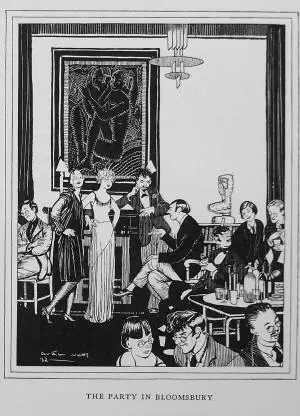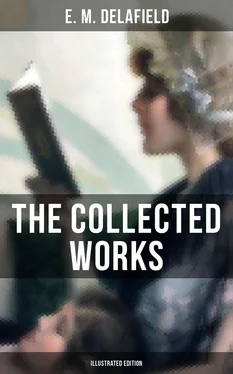Rose introduces me to hostess--she looks much as I expected, but photographs which have appeared in Press evidently, and naturally, slightly idealised. Hostess says how glad she is that I was able to come--( Query: Why?)--and is then claimed by other arrivals, to whom she says exactly the same thing, with precisely similar intonation. ( Note: Society of fellow-creatures promotes cynicism. Should it be avoided on this account? If so, what becomes of Doughty Street flat?)

Rose says Do I see that man over there? Yes, I do. He has written a book that will, says Rose impressively, undoubtedly be seized before publication and burnt. I enquire how she knows, but she is claimed by an acquaintance and I am left to gaze at the man in silent astonishment and awe. Just as I reach the conclusion that he cannot possibly be more than eighteen years old, I hear a scream--this method of attracting attention absolutely unavoidable, owing to number of people all talking at once--and am confronted by Emma I lay in rose-coloured fishnet, gold lace, jewelled turban and necklace of large barbaric pebbles.
Who, shrieks Emma, would have dreamt of this? and do I see that man over there? He has just finished a book that is to be seized and burnt before publication. A genius, of course, she adds casually, but far in advance of his time. I say Yes, I suppose so, and ask to be told who else is here, and Emma gives me rapid outline of many rather lurid careers, leading me to conclusion that literary ability and domestic success not usually compatible. ( Query: Will this invalidate my chances?)
Dear Emma then exclaims that It is Too Bad I should be so utterly Out of It--which I think might have been better worded--and introduces a man to me, who in his turn introduces his wife, very fair and pretty. (Have unworthy spasm of resentment at sight of so much attractiveness, but stifle instantly.) Man offers to get me a drink, I accept, he offers to get his wife one, she agrees, and he struggles away through dense crowd. Wife points out to me young gentleman who has written a book that is to be seized, etc., etc. Am disgusted to hear myself saying in reply Oh really, in tone of intelligent astonishment.
Man returns with two glasses of yellow liquid--mine tastes very nasty, and wife leaves hers unfinished after one sip--and we talk about Income Tax, the Pound, France, and John van Druten, of whom we think well. Rose emerges temporarily from press of distinguished talkers, asks Am I all right, and is submerged again before I can do more than nod. (Implied lie here.) Man and his wife, who do not know anyone present, remain firmly glued to my side, and I to theirs for precisely similar reason. Conversation flags, and my throat feels extremely sore. Impossibility of keeping the Pound out of the conversation more and more apparent, and character of the observations that we make about it distinguished neither for originality nor for sound constructive quality.
Emma recrudesces later, in order to tell me that James--(totally unknown to me) has at last chucked Sylvia--(of whom I have never heard)--and is definitely living with Naomi--(again a complete blank)--who will have to earn enough for both, and for her three children--but James' children by Susan are being looked after by dear Arthur. I say, without conviction, that this at least is a comfort, and Emma--turban now definitely over right eyebrow--vanishes again.
Original couple introduced by Emma still my sole hope of companionship, and am morally certain that I am theirs. Nevertheless am quite unable to contemplate resuming analysis of the Pound, which I see looming ahead, and am seriously thinking of saying that there is a man here whose book is to be seized prior to publication, when Rose intervenes, and proposes departure. Our hostess quite undiscoverable, Emma offers officious and extremely scandalous explanation of this disappearance, and Rose and I are put into taxi by elderly man, unknown to me, but whom I take to be friend of Rose's, until she tells me subsequently that she has never set eyes on him in her life before. I suggest that he may be man-servant hired for the occasion, but Rose says No, more likely a distinguished dramatist from the suburbs.
October 1st. --Direct result of literary party is that I am rung up on telephone by Emma, who says that she did not see anything like enough of me and we must have a long talk, what about dinner together next week in Soho where she knows of a cheap place? (This, surely, rather odd form of invitation?) Am also rung up by Viscountess's secretary, which makes me feel important, and asked to lunch at extremely expensive and fashionable French restaurant. Accept graciously, and spend some time wondering whether circumstances would justify purchase of new hat for the occasion. Effect of new hat on morale very beneficial, as a rule.
Also receive letter--mauve envelope with silver cipher staggers me from the start--which turns out to be from Pamela Pringle, who is mine affectionately as ever, and is so delighted to think of my being in London, and must talk over dear old days, so will I ring her up immediately and suggest something? I do ring her up--although not immediately--and am told that she can just fit me in between massage at four and Bridge at six, if I will come round to her flat in Sloane Street like an angel. This I am willing to do, but make mental reservation to the effect that dear old days had better remain in oblivion until P. P. herself introduces them into conversation, which I feel certain she will do sooner or later.
Proceed in due course to flat in Sloane Street--entrance impressive, with platoons of hall-porters, one of whom takes me up in lift and leaves me in front of bright purple door with antique knocker representing mermaid, which I think unsuitable for London, although perhaps applicable to Pamela's career. Interior of flat entirely furnished with looking-glass tables, black pouffes, and acutely angular blocks of green wood. Am over-awed, and wonder what Our Vicar's Wife would feel about it all--but imagination jibs.
Pamela receives me in small room--more looking-glass, but fewer pouffes, and angular blocks are red with blue zigzags--and startles me by kissing me with utmost effusion. This very kind, and only wish I had been expecting it, as could then have responded better and with less appearance of astonishment amounting to alarm. She invites me to sit on a pouffe and smoke a Russian cigarette, and I do both, and ask after her children. Oh, says Pamela, the children! and begins to cry, but leaves off before I have had time to feel sorry for her, and bursts into long and complicated speech. Life, declares Pamela, is very, very difficult, and she is perfectly certain that I feel, as she does, that nothing in the world matters except Love. Stifle strong inclination to reply that banking account, sound teeth and adequate servants matter a great deal more, and say Yes Yes, and look as intelligently sympathetic as possible.
Pamela then rushes into impassioned speech, and says that It is not her fault that men have always gone mad about her, and no doubt I remember that it has always been the same, ever since she was a mere tot--(do not remember anything of the kind, and if I did, should certainly not say so)--and that after all, divorce is not looked upon as it used to be, and it's always the woman that has to pay the penalty, don't I agree? Feel it unnecessary to make any very definite reply to this, and am in any case not clear as to whether I do agree or not, so again have recourse to air of intelligent understanding, and inarticulate, but I hope expressive, sound. Pamela apparently completely satisfied with this, as she goes on to further revelations to which I listen with eyes nearly dropping out of my head with excitement. Stevenson, Templer-Tate, Pringle, are all referred to, as well as others whose names have not actually been borne by Pamela--but this, according to her own account, her fault rather than theirs. Feel I ought to say something, so enquire tentatively if her first marriage was a happy one--which sounds better than asking if any of her marriages were happy ones. Happy? says Pamela. Good Heavens, what am I talking about? Conclude from this, that it was not a happy one. Then what, I suggest, about Templer-Tate? That, Pamela replies sombrely, was Hell. (Should like to enquire for whom, but do not, naturally, do so.) Next branch of the subject is presumably Pringle, and here I again hesitate, but Pamela takes initiative and long and frightful story is poured out.
Читать дальше













